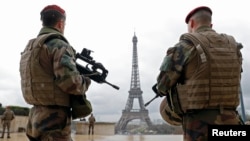France's parliament is extending a state-of-emergency for two months to cover two upcoming major sports events.
The state-of-emergency has been in effect since 130 people were killed in November during a coordinated series of terrorist attacks on bars, cafes, a football stadium and a music hall in Paris.
France is "clearly the country most threatened" by Islamic State [IS] and al-Qaida, Patrick Calvar, the French government's spy chief, told a parliamentary committee last week. "And we know Daesh [IS] is planning new attacks," he added.
Calver fears the terrorists are planning a "new form of attack" that can be repeated in areas where large crowds gather, "to create a climate of panic."
Between June 10 and July 10, two million fans are expected to attend the Euro 2016 football tournament in 10 cities throughout France.
Millions of other spectators are expected to gather for the Tour de France cycling race between July 2 though July 24.
"Giving up on sporting events and cultural events is precisely to give in to the terrorist threat," Prime Minister Manuel Valls told RTL, a French radio network.
France's police force has been under immense pressure following two militant attacks last year and regular street protests. But Valls assured citizens the government is fully prepared to make sure the sports events run smoothly. "We will not drop our guard," he said.
The government said in mid-April that since the state-of-emergency was first imposed, police have conducted about 3,500 searches, taking 56 suspects into custody and placing 69 others under house arrest.
Under the latest extension, the police will no longer have the authority to raid homes without a court order, as they have since November.
The French Human Rights League (LDH) is opposed to the extension. It says the government has become "hooked on the state-of-emergency."





